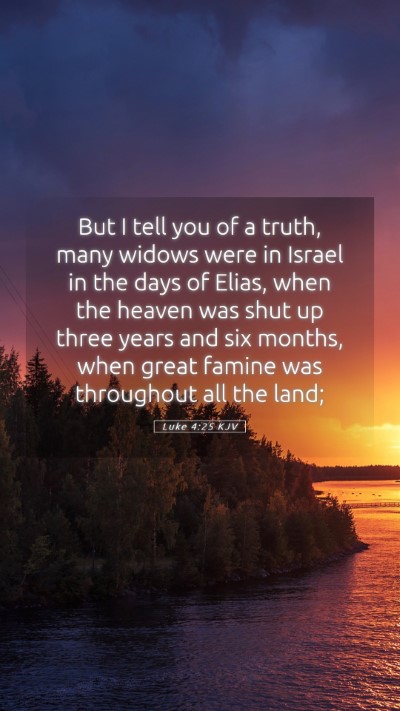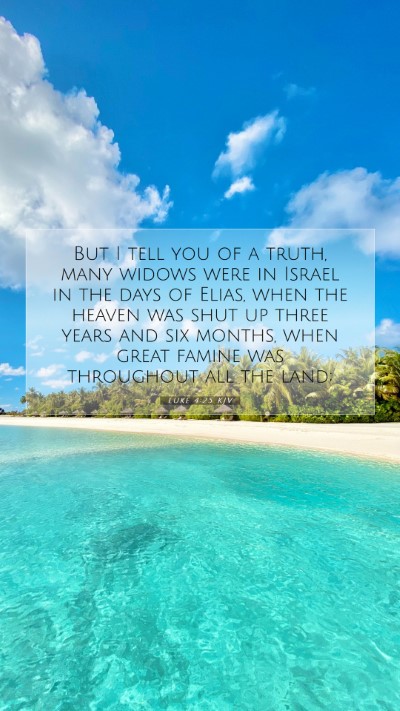Understanding Luke 4:25 - Bible Verse Commentary
Luke 4:25 states, "But I tell you of a truth, many widows were in Israel in the days of Elias, when the heaven was shut up three years and six months, when great famine was throughout all the land;" This verse is part of a larger discourse where Jesus references the historical account of the prophet Elijah and the significance of God's blessings being extended beyond the borders of Israel.
Contextual Background
In examining the Bible verse meanings proposed in Luke 4:25, it's essential to consider the historical context. During Elijah's time, Israel faced severe drought and famine, which serves as a backdrop for this teaching. Jesus highlights that during this challenging period, Elijah was sent not to the Israelites but to a widow in Zarephath, a Gentile, signifying God's mercy extending beyond the chosen nation.
Insights from Public Domain Commentaries
-
Matthew Henry:
Henry emphasizes the importance of recognizing God's impartiality and the broader scope of His grace. He notes that Jesus' reference to Elijah illustrates how divine favor is not limited to the faithful of Israel, pointing instead to a heartfelt relationship that can exist regardless of nationality. Henry suggests that Jesus is illustrating a divine principle that transcends cultural boundaries and historical circumstances.
-
Albert Barnes:
Barnes points out that the mention of Elijah and the circumstance of the widow serves to provoke a deeper reflection among His audience about their own spiritual condition. He implies that Jesus uses this reference to challenge the exclusivity often assumed by the Jews concerning God's favor, suggesting that many who are seen as outsiders can receive blessings that the insiders forfeit due to their unbelief.
-
Adam Clarke:
Clarke gives a historical interpretation of the duration of the drought mentioned, reflecting on the period's significance. He mentions the significance of the widow's faith and her actions that brought forth God's provision. By doing so, Clarke emphasizes the message of faith and obedience required to experience God's involvement in one's life. Jesus suggests that, much like that widow, those outside of traditional boundaries may demonstrate faith that God's people lack.
Significance of the Verse
The meaning of Bible verses like Luke 4:25 is not just historical; it is also deeply theological. This verse suggests that God’s concern for humanity transcends race, culture, and established religious systems. Instead, it emphasizes faithfulness and the recipient's heart over their heritage.
Application for Today
In contemporary Bible study groups and the pursuit of Bible verse interpretations, believers are encouraged to explore how this passage teaches about the inclusivity of God's blessings. It leads to vital Bible study insights about how we view ourselves in relation to others and our understanding of divine grace.
Additional Cross References
- 1 Kings 17:8-16 - The story of Elijah and the widow at Zarephath.
- Luke 4:24 - The rejection of Jesus in His hometown.
- Romans 2:11 - God shows no favoritism among people.
- John 4:39-42 - The Samaritans who believe in Jesus.
The explanation of Luke 4:25 encourages believers to reflect on how to interpret Bible verses through the lens of faith, obedience, and the universal scope of God's love. By recognizing the historical implications and theological truths embedded in the text, individuals can cultivate a richer understanding of both Scripture and their relationship with God.


